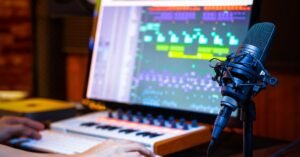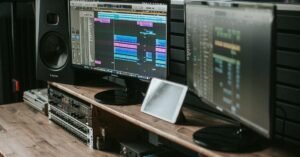Starting a podcast can be an incredibly rewarding endeavor, but finding the right tools is crucial to creating a high-quality listening experience. Whether you’re a seasoned podcaster or just getting started, the right podcast recording software can make a world of difference. From free options to more advanced tools, each offers unique features that cater to different needs and experience levels.
In this blog, we’ll explore the best podcast recording software available, helping you find the perfect fit for your creative journey. Get ready to elevate your podcast production with ease!
How to Choose the Best Software For Podcast Recording

There’s no one-size-fits-all when it comes to podcast recording software. Each podcaster has unique needs based on their format, budget, and technical expertise. Here are the crucial factors to consider when selecting the right software for you.
Compatibility and Ease of Use
Before you dive into what the software can do, you need to ensure it plays nice with your existing setup. Check if the software is compatible with your operating system—whether you’re on Mac, Windows, or even Linux.
Equally important is usability. You don’t want to spend hours figuring out how to navigate the interface. Choose software that feels intuitive and doesn’t require a steep learning curve, especially if you’re a beginner. The goal is to focus on content creation, not get bogged down by complex menus and buttons.
Recording Quality and Functionality
The primary purpose of podcast recording software is to capture crystal-clear audio (and sometimes video). Look for software that supports high-resolution recording—ideally at 48 kHz for audio. If you plan to produce video content, some software offers up to 4K video resolution, which can be a boon for future-proofing your work.
Functionality is another key aspect. Does the software offer multi-track recording? Can it separate audio and video tracks for each participant? These features give you more freedom during post-production, allowing you to fine-tune each element without affecting the rest.
Price and Editing Features
While some of the best tools might come with a price tag, free options are available that still pack a punch. Evaluate what you’re getting for any paid plans—do they justify their cost with robust features and flexibility? Also, consider trial periods offered by many providers to test drive their tools before committing.
Editing capabilities directly within your recording software can save you time and money. Having an integrated suite of editing tools, from basic trims to advanced audio enhancements, means you won’t have to jump between different platforms to polish your podcast.
Top Podcast Recording Software for 2025

With a plethora of options out there, it can be overwhelming to choose the right tool. To help narrow it down, here are our top picks for podcast recording software in 2025.
1. Best Overall: Riverside
Riverside shines as a superb all-rounder for podcasters of any level. It’s a web-based platform, making it accessible across various devices without hefty downloads. Whether you’re a solo podcaster or frequently host interviews, Riverside can handle it all.
Key features:
- Studio-quality recordings: Up to 4K video and 48 kHz audio.
- Local recording: Ensures high resolution by recording directly to each participant’s device.
- Separate tracks: Provides individual audio, video, and screen recording tracks.
- Remote recording capabilities: Supports up to 10 participants, offering flexibility for larger panel discussions.
- AI enhancements: Generate transcripts, create automated show notes, and make promotional clips seamlessly.
Riverside’s price is reasonable, starting with a free plan and scaling up to include more features for dedicated podcasters.
2. Best Free Software: Audacity
Audacity remains a favorite for podcasters on a budget. Although it’s an audio-only platform, it offers a comprehensive suite of editing tools. Its open-source nature means it’s constantly being improved upon, and it’s compatible with Mac, Windows, and Linux.
Key features:
- High-quality audio recording: Supports up to 192 kHz sample rate and 32-bit float depth.
- Editing tools: From basic edits to more advanced manipulations like track splitting and fading.
- Audio effects: A plethora of built-in effects and support for third-party plugins.
- Sound-activated recording: Begins recording only upon detection of sound, saving space and effort.
Audacity’s straightforward interface might look dated, but it’s incredibly functional once you get the hang of it.
3. Best for Remote Interviews: SquadCast
SquadCast is crafted for those who conduct a lot of interviews—and do so remotely. It offers high-end audio quality and records each participant’s audio and video on separate tracks, which is a boon for post-production.
Key features:
- Separate track recording: Precise editing with audio and video on individual tracks.
- Dolby integration: Enhances audio with noise and echo cancellation.
- Descript integration: Offers an assortment of AI tools for speedy editing workflows.
- Easy scheduling: Syncs with calendars like Apple, Google, and Outlook to keep your sessions organized.
With pricing that starts modestly, SquadCast is a steal for podcasters who prioritize ease of connectivity and quality recording for their interviews.

Best Podcast Recording Software for Beginners
Embarking on your podcast journey is an exciting adventure! While diving into the podcasting world, having intuitive and user-friendly software can make all the difference. Let’s explore some excellent options that are perfect for beginners.
4. GarageBand
Key Features:
- Free on macOS: An ideal starting point for Mac users, GarageBand comes pre-installed and is entirely free, providing easy access to podcasting capabilities.
- User-Friendly Interface: Designed with simplicity in mind, it’s excellent for those who are new to audio editing.
- Audio Quality: Allows recording in standard 44.1 kHz sample rate/16-bit depth, ensuring decent audio quality.
- Multi-Track Recording: Supports multitrack recording, letting you record separate tracks for editing flexibility.
- Built-In Sound Effects: Users have access to a sound library which can enhance podcast scenes.
- Mobile App: Perfect for recording on the go, the iOS app aids in quick and easy recording and editing wherever you are.
GarageBand’s intuitive design and integrated setup make it a fantastic tool for budding podcasters. It offers non-complex functionality to help you produce quality audio content with minimal fuss.
5. Podcastle
Key Features:
- Web-Based Flexibility: Compatible with macOS, Windows, and Linux, Podcastle is a versatile choice for beginners.
- AI Enhancements: Utilize AI tools for transcriptions and silence removal, simplifying the content creation process.
- High-Quality Recording: Supports lossless audio recording, ensuring top-notch quality.
- Collaborative Tools: Easily bring guests into recording sessions through a browser, minimizing the need for additional software.
- Integrated Publishing Tools: Directly publish your podcast from the platform, streamlining your workflow.
Podcastle’s simplicity and innovative AI features make it an excellent fit for new podcasters. The platform is accessible and provides essential tools needed to create engaging audio content.
6. Descript
Key Features:
- All-in-One Solution: Offering seamless integration for recording, editing, and creating clips, Descript stands out for its comprehensive capabilities.
- Text-Based Editing: This revolutionary feature allows you to edit your podcast by editing text, similar to a word document.
- AI-Powered Tools: Automate routine tasks, such as removing background noise and adjusting audio levels.
- Studio Sound: Elevate your audio quality with enhanced sound capabilities.
- Collaborative Integration: Work seamlessly with your team using cloud-based collaboration tools.
Descript demystifies the editing process for newcomers, allowing you to jump into podcasting with powerful resources without feeling overwhelmed. Its AI tools simplify complex editing processes for a hassle-free experience.
Best Podcast Recording Software for Professionals
For seasoned podcasters or those aspiring to take their podcasting to the next level, robust software with advanced features is a necessity. Here are top picks that combine power with advanced capabilities.
7. Adobe Audition
Key Features:
- Advanced Multi-Track Editing: Capture and edit multiple tracks with ease, ensuring professional-quality sound.
- Extensive Toolset: Includes features like waveform editing, built-in audio effects, and audio leveling.
- Official Adobe Integration: Sync seamlessly with software such as Premiere Pro for those working with both audio and video.
- Script Templates: Provides recording templates for streamlining the setup process.
- Noise Reduction: Offers top-level noise reduction capabilities to refine your podcast’s sound quality.
Adobe Audition is a powerhouse for professionals seeking detailed control over their podcast production. The extensive suite of tools within this software makes it a favorite for creating finely-tuned, high-quality audio.
8. Pro Tools
Key Features:
- Highest Audio Quality: Supports recording at up to 192 kHz and 32-bit float, ensuring superb audio fidelity.
- Multi-Track Mastery: Impressive capabilities for tracking multiple channels simultaneously.
- Customizable Interface: Allows for personalization of the workspace, including shortcuts and layout, fitting your workflow needs.
- Professional-Grade Plugins: Compatible with numerous plugins for advanced audio effects and mixing.
- Immersive Audio Support: Allows mixing for surround sound formats, providing creative freedom.
Pro Tools is a renowned software in the audio industry, catering to those who demand precision and professionalism in their work. Its capability to handle complex projects makes it indispensable for seasoned podcasters.
9. Reaper
Key Features:
- Extensively Configurable: Offers vast customization options to tailor the interface and functions exactly how you need them.
- Budget-Friendly Licensing: Despite its professional-grade features, Reaper offers affordable licensing, providing great value.
- Comprehensive Audio Control: Supports meticulous control over the editing process, with real-time monitoring and a wide range of effects.
- Efficient Performance: Despite its extensive features, Reaper maintains fast performance and small installation size.
- Plug-In Support: Compatible with a wide array of third-party plugins to enhance and expand capabilities.
Reaper’s adaptability and robust feature set make it ideal for professional podcasters. Its multi-faceted toolset, coupled with affordability, makes it a compelling choice for high-quality production on a budget.
Essential Features of Podcast Recording Software
When venturing into the expansive realm of podcast creation, having the right recording software can make or break your production quality. Let’s delve into some essential features to look out for in podcast recording software, ensuring your podcast sounds as professional as possible.
Multitrack Recording
Multitrack recording is a game-changer, especially if your podcast includes multiple hosts or guests. This feature allows each participant’s audio to be recorded on a separate track, which is crucial during the editing process.
Why, you ask? It affords you the luxury of adjusting each track individually. That means you can tweak the volume of a quieter speaker, eliminate background noise from a rowdy pet that barked mid-interview, or even mute someone temporarily without affecting the entire recording. Software like Riverside and GarageBand offer robust multitrack recording capabilities.
Plus, for Mac users, GarageBand even comes pre-installed. It’s a boon for those just starting, seeking both simplicity and functionality.
AI and Automation Tools
In the era of AI, automation tools have become indispensable for streamlining workflows and enhancing sound quality. Most modern podcast recording software comes equipped with AI-driven features to simplify the mundane tasks.
For instance, Descript lets you edit your podcast like a word document, automatically removing filler words and silences so you can focus on creativity. Riverside also offers handy tools like Magic Clips to create shareable snippets of your best moments.
If you’re curious about other AI tools for podcast editing, there are plenty of options to explore that can elevate your production game. Keep an eye out for these features if you love tinkering with tech to enhance your podcast.
Integration with Other Platforms
Another vital feature is the ability to seamlessly integrate with other platforms. This integration simplifies the workflow and increases efficiency, saving you both time and effort. Consider software that connects smoothly with the platforms where your listeners reside.
Riverside, for example, integrates directly with Spotify, turning what could be a cumbersome task into a click-and-share operation. Similarly, Zencastr provides integration options that can help distribute your podcast across multiple platforms swiftly.
Having an integrated setup not only makes uploading and sharing episodes quicker but also boosts your podcast’s accessibility to a broader audience.
Conclusion
Choosing the best podcast recording software comes down to what works for you. Whether you’re an expert looking for top-notch sound with tools like Adobe Audition or just starting out with something easy like Audacity, there’s plenty to pick from.
Each option has its strengths—Riverside records everyone separately, Descript makes editing a snap with smart features, and GarageBand keeps things simple for beginners. Feel free to try a few and switch as your podcast grows. The goal is to find a tool that feels good to use and helps you record with confidence. Now, go start creating your podcast!

